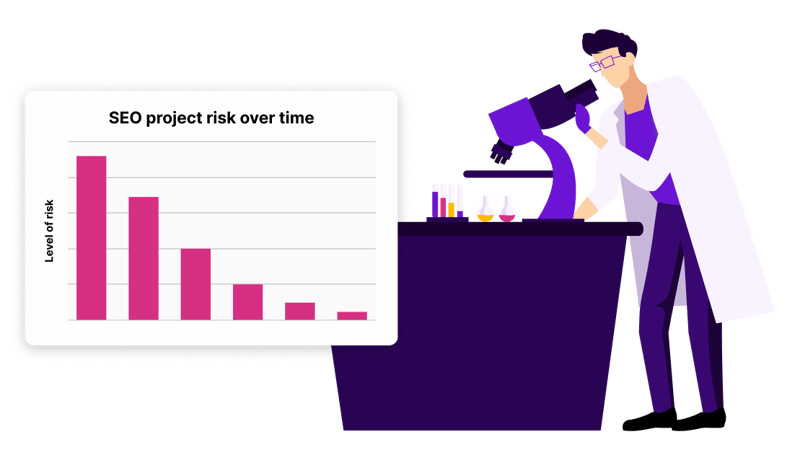It’s been a tumultuous few years, to put it mildly. Even if we set aside the unprecedented global pandemic, we’ve seen historically high inflation, rising interest rates, and a looming recession. It seems apt that the Collins Dictionary word of the year for 2022 was permacrisis.
For businesses, this environment means tighter budgets and less appetite for risk. And that makes bigger, bolder marketing initiatives a harder sell. In fact, 71% of CMOs say they won’t have sufficient budget to execute their strategy this year.
So, what does this mean for SEO teams? On the one hand, you’re under more pressure than ever to deliver attributable results. On the other, you’re also pressured to keep costs in check.
And that’s why, in this risk-averse environment, SEO testing is more important than ever.
What do your SEO projects need to deliver?
First, let’s look at how the current macroeconomic environment impacts SEO teams.
From speaking to SEO teams at big companies, there are three major challenges that I keep hearing:
- Getting conclusive test results. While many larger SEO teams already use some form of SEO testing, that doesn’t mean it’s delivering the results they need. You may find that you can’t test enough changes quickly, or your results aren’t clear and actionable. And if your tests aren’t delivering statistical winners, they aren’t going to help shape your SEO strategy.
- Demonstrating incremental value. With the increasing pressure on budgets, SEO teams need to do more with less and prove their results more rigorously than ever before. Delays in showing results can be hard to justify — but showing your impact on a week-to-week, month-to-month basis can be a significant challenge.
- Reporting back to the business. Businesses increasingly expect their SEO teams to deliver specific, granular reports on a per-initiative basis. This means adopting tools that will let you track the impact of each change, which many teams have yet to do.
Each of these challenges shares an underlying basis: the need to deliver clear, verifiable results from your SEO strategy.
Meeting this demand means being able to track the impact of every initiative. But it also means avoiding losing changes and identifying the big winners. After all, tracking your results is no help if those results don’t show the uplifts you’d expect.
That’s why a bold SEO testing program is essential right now. But how can you implement testing in a way that will speak most clearly to those top-line business demands? It’s all a question of mitigating risk.
How testing helps de-risk your SEO projects
There’s no denying it — bold SEO plays require substantial budgets. And while that’s a big ask right now, for larger websites that are already performing well, there’s little alternative. Ultimately, smaller projects aren’t going to move the needle.
Nevertheless, getting a big SEO project off the ground can require significant investments of time, money, and political capital. If you’re trying to build a robust SEO testing program at the same time, this can seem like an added burden.
But if you structure your pitch correctly, SEO testing can make it far easier to get sign-offs for ambitious SEO projects. That’s because testing can work as a de-risking strategy — as long as you present it right.
Here’s the four-stage approach I’d suggest:
1. Quick wins pay for the project
Okay, you have a big vision for your project — an ambitious goal that will have a transformative impact on the business. Naturally, this is a hard sell. Unfortunately, SEO is full of projects that overpromise and underdeliver. Scepticism over the big payoff is to be expected.
But not if you begin by showing the project can confidently pay for itself. This gives you a firm basis to start from — in a worst-case scenario, you’ll still cover your costs.
We often talk about this first step in terms of the backlog that most SEO teams have. You’ve got ideas tucked away in a drawer from the last five SEO audits you did — you just don’t have the time or resources to implement them.
But with SearchPilot, our meta-CMS technology means you can just roll out a bunch of these simple fixes quickly. And there you go — you’ve immediately managed to de-risk the project with some quick wins.
2. Efficiency gains provide business benefits
The second strand of your business case should focus on this expectation to do more with less — a frequent demand right now. And testing can help deliver those much-needed efficiency gains, too.
One of the major resource costs for your SEO strategy is engineering time. If every website change requires the involvement of your engineering team, that’s a significant contribution to the overall cost of your program. And if the changes they roll out don’t actually result in a clear benefit, proving your ROI becomes much more difficult.
But with a robust SEO testing program in place, you can avoid this scenario. SEO testing allows you to identify the winning changes, those that are inconclusive, and those that would have a negative impact. Your engineering team only needs to implement the first of these. This reduces the overall demand on their time and ensures their efforts translate into increased search traffic.
.png?width=2032&height=1305&name=blog-seeking-efficiency%20(1).png)
Essentially, you implement the beneficial changes and avoid the negative ones — all while reducing the engineering demand. And that makes for a pretty strong business case from an efficiency standpoint.
3. Avoiding losses adds security
So, you’ve made your quick wins to pay for the project. Then, you’ve layered your efficiency gains on top. Now, you can add a further business benefit: security.
If you’re not testing rigorously, then there are no guarantees when it comes to your SEO initiatives. Even the changes that seem like obvious winners can have unintended consequences. And it’s not just a question of avoiding major disasters — even marginal losses can mount up.
With businesses trying to find a steady footing in these turbulent times, you need to offer certainty in order to sell your project. And that’s what SEO testing can provide.
With testing, every change you want to make will have evidence to back it up. So, there’s no need to rely on trust from your leadership team. You can simply show them the numbers.
4. Discovering the big wins
Of course, it’s not all about mitigating risk and avoiding losing changes. Once that’s all in place, you’ll have a foundation for finding those big wins — the significant uplifts you couldn’t have identified any other way. This includes the radical initiatives and riskier bets that your competitors, who aren’t testing as rigorously, can’t compete with.
These are the cherry on top of your SEO strategy. You’re not reliant on them to make your project a success or to prove ROI. But by finding them, you can achieve your biggest ambitions and make a stronger pitch for your next project.
Test faster with SearchPilot
SEO teams are facing greater pressure than ever to deliver results. But in a risk-averse environment, it’s hard to justify the kind of bold plays that can really move the needle.
That’s why SEO testing is essential. With an effective testing program in place, you can build a watertight business case for even the most ambitious initiatives.
But what if testing itself is a challenge? Well, that’s where SearchPilot comes in. Our SEO A/B testing platform helps SEO teams deliver large-scale, comprehensive testing programs at pace.
If you want to see how it works, request a demo with one of our experts.



